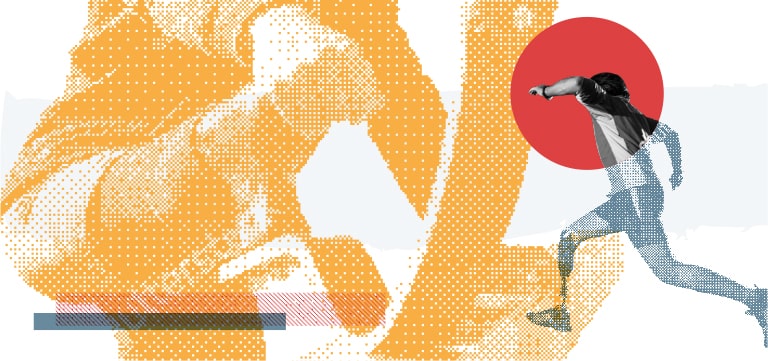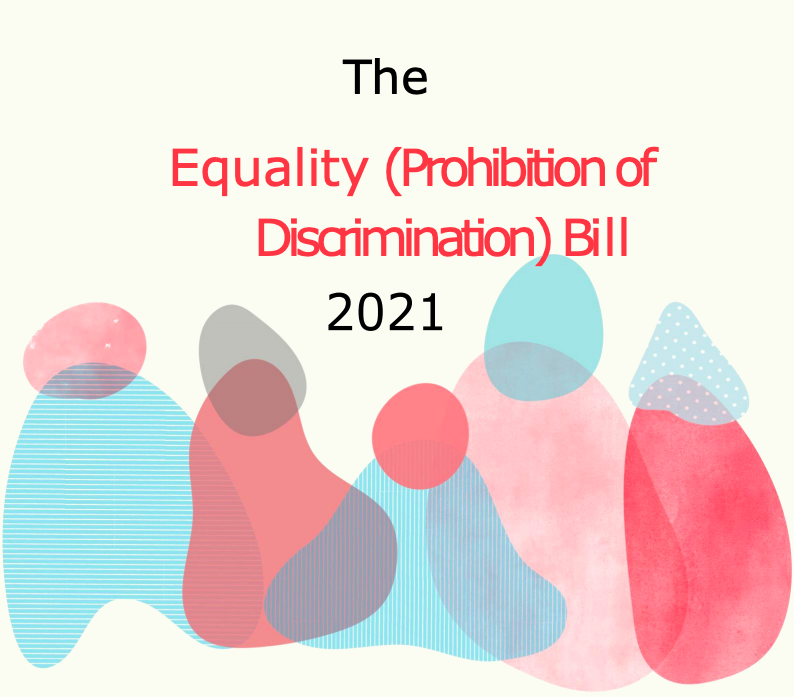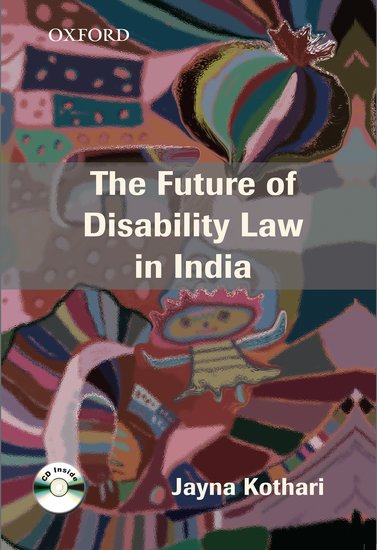Disability Justice: Court Decisions on Disability Rights in India
This book is part of our “Equality Now!” series of four resource books, one on each…

This book is part of our “Equality Now!” series of four resource books, one on each…

In this article, published by the Oxford Human Rights Hub, Mansi Singh, and Mihir Rajamane explore the need to accommodate welfare in judicial analysis of LGBTQ+ rights, by acknowledging close intersections between queer identities and identities of caste, disability and class.
Supreme Court Advocate and co-founder of the Centre for Law and Policy Research(CLPR) Jayna Kothari talks about the recent judgement of the Supreme Court in Vikash Kumar vs Union Public Service Commission (UPSC) & Ors.
CLPR’s draft Equality Bill 2021 takes a new step in addressing discrimination experienced by people on the basis of caste, gender, religion, transgender and intersex identity, disability and other grounds. It aims to promote equality, prohibit different types of discriminatory conduct, provide adequate civil remedies and set up fora for redressal that are accessible and effective in addressing discrimination.

This Policy paper explores the importance of the intersections of disability and caste. The authors argue that to address the fulfillment of basic social rights of employment, education, housing & health for the most vulnerable, there is need to look at people from inter sectional perspective. The Policy paper also recommends empirical research and data collection to understand depth of the socio-economic deprivation faced by Dalits/Adivasi persons with disabilities, need of inter sectional approach in policy and welfare schemes, need of Anti-discrimination law and also for social movements to work together for overall welfare of marginalized sections of the society.

Jayna Kothari and Nina de puy Kamp write on Disabilities Law in the Wire.
The article critically examines the basis of the decision of the Supreme Court to strike down section 309. Further, the author argues for the need for policy initiative, better access mental health care, and recognition of mental health care and health rights as a necessity for those contemplating and committing suicide.
The Rights of Persons with Disabilities Bill 2014 has garnered much criticism for its faulty drafting, and the manner in which the final draft of the Bill was made. In this article, Jayna Kothari highlights multiple issues with the Bill by focusing on the flawed definition of persons with disabilities in the Bill.
This Report examines the state of the right to health for persons with disabilities in India from the perspective of “equal access” and “non-discrimination.” It is based on an empirical study conducted by CLPR on the experiences of persons with disabilities in accessing healthcare. In addition to the empirical study, it also draws on the insight gathered from four zonal and one national consultation meetings organized by CLPR on disability rights. The outcomes from the consultations have been referenced in this paper. This Report was prepared for Human Rights Law Network, Indian Association of Muscular Dystrophy and National Alliance on Access to Justice for People Living with Mental Illness.
In this article published in The Hindu, Jayna Kothari and David Seidenberg argue that when an electoral system structurally discriminates against particular categories such as persons with disabilities, it is tantamount to a failure of the democracy as a whole.
The author alludes to the 2004 Supreme Court order in Disability Rights Group v. Election Commission (EC) which had directed the Election Commission to facilitate favourable voting conditions in all states for persons with disability. The author contends that despite the EC’s immediate directive to all state commissions to comply with this order, the actual level of accessibility in voting has not improved. The author proposes technology solutions like voting through mobiles for easy exercise of the right to vote by persons with serious disabilities.
In this article, the authors stress on the necessity of ensuring an enabling atmosphere for disabled persons to exercise their fundamental right to vote, which is an essential aspect of democracy. They urge that electoral participation should go beyond the installation of ramps at polling booths, in order to make polling sites accessible.
CLPR in collaboration with the Centre for Internet and Society (CIS) put together the National Resources Kit for Persons with Disabilities. This resource kit was prepared in order to facilitate access to relevant information for all stakeholders. This was done with the aim of ensuring meaningful participation of disabled individuals in governance.
In light of the upcoming 2014 Lok Sabha elections, CLPR in collaboration with the Centre for Internet and Society, has prepared a Report titled “Enabling Elections: Making the 2014 General Elections Participatory and Accessible for Voters with Disabilities”. This Report addresses the barriers that voters with disabilities face during elections and recommends solutions for the same. A representative democracy is defined by its access to voting and full participation in the political affairs of the country equally for all its citizens, which includes voters with disabilities. This report analyses the legal framework on the rights of persons with disabilities with respect to free and fair elections and argues that the State is constitutionally mandated to enforce this right. The Report examines the relevant provisions of the Representation of People Act, 1951, the Constitution, the relevant directions of the Supreme Court of India and the international conventions.
The Rights to Persons with Disabilities Bill, 2014 was meant to be a substantial improvement over the existing Persons with Disabilities (Equal Opportunities, Protection of Rights and Full Participation), Act, 1995. However, this article highlights in two crucial ways how the Bill fails to make a meaningful departure from the existing legislation. Firstly it retains the medical model of disability and does not acknowledge the role of the social environment is disabling certain individuals. Secondly, it does not put any obligations on the private sector to reserve jobs for the disabled.
This article is a review of the book ‘Disability Studies in India: Global Discourses, Local Realities’ , edited by Renu Addlakha, Routledge, New Delhi, 2013. Vol., 38 No. 1, January 2014
SINCE 1996, when the Persons with Disabilities (Equal Opportunities, Protection of Rights and Full Participation) Act, 1995 (PWD Act), came into force, by far the majority of cases taken to court have been about equal opportunity in public employment, that is, reservation of jobs for persons with disabilities and related matters such as promotions, identification of posts and eligibility. This struggle is in many ways not that different from the caste and gender battles for affirmative action in government employment.
The new Mental Health Care Bill, 2013, based on the principles of the UN Convention on the Rights of Persons with Disabilities and moves the current mental health care law from a medical to a social model based on human rights. Some of the progressive aspects of the new bill include the recognition of the legal capacity of persons with psycho-social disabilities and of advance directives, as well as the protection of the rights to equality and dignity. But the bill also has several conditions that could negate the guarantee of these rights. In this respect, the bill has been debated intensely within the disability community. Widely speaking, the need to decriminalise attempts to suicide have been considered by the courts, but only from the perspective of the right to life under Article 21 of the Constitution, not from a mental health perspective. By recognising the link between suicide rates and mental health, the bill is progressive in that it imposes a duty on the government to provide care, treatment and rehabilitation for a person with a mental illness and who has attempted suicide. However, the bill does not give any guidelines on how care and treatment should be provided for such vulnerable persons.
India ratified the UN Convention on the Rights of Persons with Disabilities 2006 (UNCRPD) and the Optional Protocol to it in 2007. The UNCRPD‘s objective is to protect and promote the rights of persons with disabilities from a social model unlike the earlier medical model of disability. It ensures that persons with disabilities become holders of rights rather than being objects of welfare measures and medical treatment (UN et al 2007). To that extent, ―the UNCRPD marks a paradigm shift in attitudes and approaches to persons with disabilities and views them not as objects of charity, ‘but subjects with rights'(Murthy 2010: 153).
Jayna Kothari has published The Future of Disability Law in India: A Critical Analysis of the Persons with Disabilities (Equal Opportunities, Protection of Rights and Full Participation) Act 1995 (Oxford University Press 2012).

CLPR collaborated with the Centre for Internet and Society and Inclusive Planet to assess the Working Draft on the Rights of Persons with Disabilities Act, 2010 (the 1 December, 2010 version) and examine the extent to which the Drafting Committee had exceeded its mandate.
CLPR, the Centre for Internet and Society and Inclusive Planet prepared a Note on the working of the various authorities under the Working Draft of the PWD Act, 2011
CLPR, in collaboration with Centre for Internet and Society and Inclusive Planet, published comments on the Working Draft of Rights of Persons with Disability Act, 2010. Following this, CLPR also prepared a Note that critically reviewed the authorities under the proposed Act.
This is a brief Note on the Working Draft of the Persons with Disabilities Act dated 1.12.2010 (“Working Draft”) on the specific issue of how it relates to the three other disability legislations being the National Trusts Act 1999, the Mental Health Act 1987 and the Rehabilitation Council of India Act, 1992. From the Working Draft it is seen that there are several provisions which are contradictory to some of the provisions in these three legislations in significant ways. This Note also raises concerns as to whether the Working Draft has exceeded its mandate given by the Committee to only amend the Persons with Disabilities (Equal Opportunities, Protection of Rights and Full Participation) Act, 1995 (“PWD Act”) by attempting to draft a comprehensive disability law which includes even the other disability legislations.
Jayna Kothari has published ‘The UN Convention on Rights of Persons with Disabilities: An Engine for Law Reform in India’ in the Economic and Political Weekly.
Filter by
By Types
The petitioner, Prema Ram, is a person with benchmark disability having 50% of Haemophilia which is characterized as a rare, incurable genetic disease which causes uncontrolled bleeding which in turn leads to locomotor disability, loss of limbs, and could be life threatening.
CLPR successfully challenges appointments based on fraudulent disability certificates, leading to the cancellation of fake selections and appointment of the petitioner.
A person with 90% disability petitioned against the Telengana State Public Service Commission for an inaccessible exam center, seeking reasonable accommodation under the Rights of Persons with Disabilities Act 2016. The Court disposed of the petition, directing the Commission to consider the petitioner’s request for a more accessible exam center in their district.
CLPR on behalf of the National Federation of the Blind, filed a PIL – W.P. No. 20317/2021 before the Karnataka High Court to ensure that a comprehensive transfer policy is formulated by the government to enable people with disabilities to work without discrimination and to provide them reasonable accommodation as mandated under the Rights of Persons with Disabilities Act 2016 (“RPwD Act”).
18th
Dec 2025
Venue Online on Zoom
Time 5:00 - 6:30pm
16th
Dec 2024
Venue The Lalit Fire Brigade Lane, Barakhamba, New Delhi, Delhi 110001
Time 6:30 pm - 8:00 pm
12th
Sep 2024
Venue Canara Bank Rural Self Employment Training Institute (CB RSETI) Chadalapur Cross, Chickaballapur
Time 09:30 AM - 02:00 PM
13th
Jul 2024
Venue India International Centre, New Delhi
Time 9:30 AM - 2:00 PM
Janchowk
News Click
A book launch event and panel discussion were held in Delhi recently on the crucial role of courts in shaping rights-based jurisprudence.
Supreme Court Observer
News Karnataka
Senior Research Associate Nithya Rajshekhar gets featured in this article advocating for practicla solutions to enhance safety and accessibility for disabled individuals in the city.
The Centre for Law & Policy Research (CLPR), in collaboration with Association of People with…
The Centre for Law & Policy Research (CLPR), in collaboration with PACTA, organised an awareness…
CLPR launches “Equality Now!” – a series of four resource books on disability rights, transgender rights, women’s rights, and caste discrimination featuring discussions with legal experts and community leaders on making rights-based jurisprudence more accessible.
Centre for Law and Policy Research (CLPR) and Karnataka Vikalchetanara Sanghatane (KVS) organized a ‘Know Your Rights and Entitlements’ (KYRE) session specifically designed to educate the local community about the rights and legal options available to persons with disabilities.